Management Strategies and Practices at TESCO: A Comprehensive Report
VerifiedAdded on 2023/01/12
|12
|3728
|99
Report
AI Summary
This report provides an in-depth analysis of management approaches and their application within TESCO, a leading retail company. It begins with an introduction to management processes and TESCO's aims and objectives, focusing on maximizing sales and minimizing costs through various strategies. The report then explores the role of operational management, emphasizing efficiency, research and development, quality management, and flexibility. It delves into classical and contingency management approaches, detailing their objectives and implications for TESCO. Furthermore, the report examines the importance of motivation in the workplace, highlighting its impact on employee efficiency and relationship building. Finally, it discusses the impact of effective communication and teamwork support on business performance, providing a comprehensive overview of TESCO's management practices and their effects.
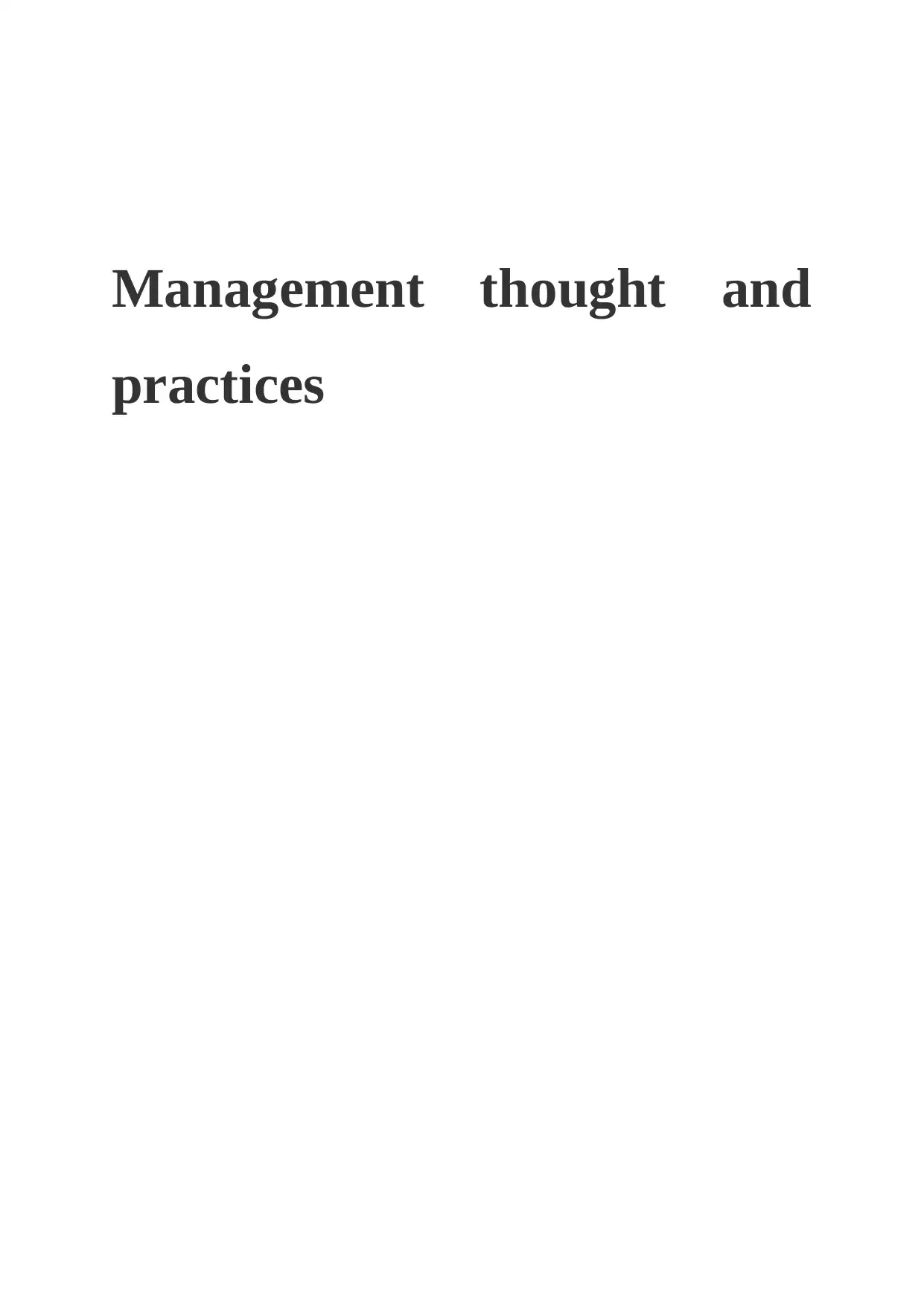
Management thought and
practices
practices
Paraphrase This Document
Need a fresh take? Get an instant paraphrase of this document with our AI Paraphraser
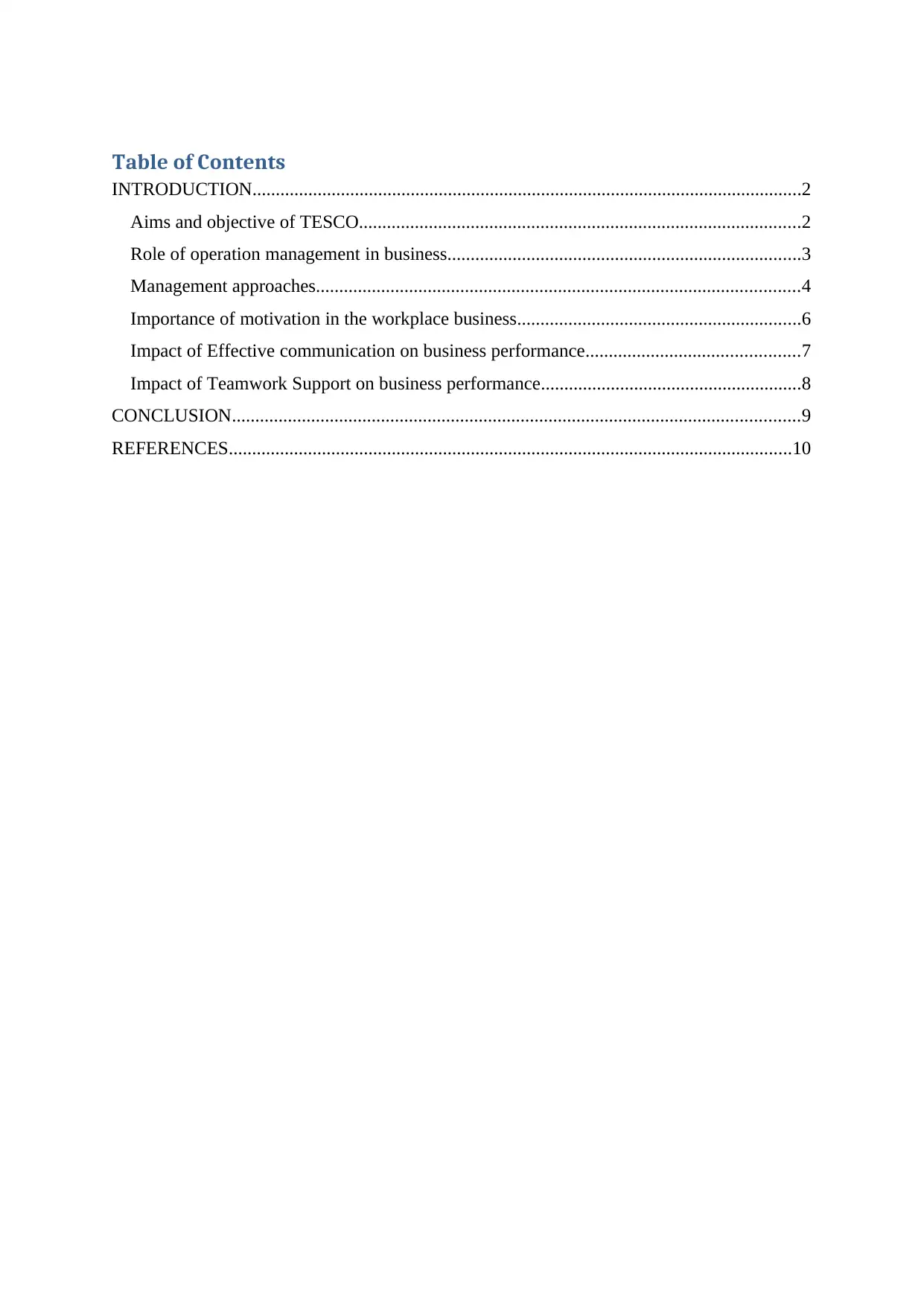
Table of Contents
INTRODUCTION......................................................................................................................2
Aims and objective of TESCO...............................................................................................2
Role of operation management in business............................................................................3
Management approaches........................................................................................................4
Importance of motivation in the workplace business.............................................................6
Impact of Effective communication on business performance..............................................7
Impact of Teamwork Support on business performance........................................................8
CONCLUSION..........................................................................................................................9
REFERENCES.........................................................................................................................10
INTRODUCTION......................................................................................................................2
Aims and objective of TESCO...............................................................................................2
Role of operation management in business............................................................................3
Management approaches........................................................................................................4
Importance of motivation in the workplace business.............................................................6
Impact of Effective communication on business performance..............................................7
Impact of Teamwork Support on business performance........................................................8
CONCLUSION..........................................................................................................................9
REFERENCES.........................................................................................................................10
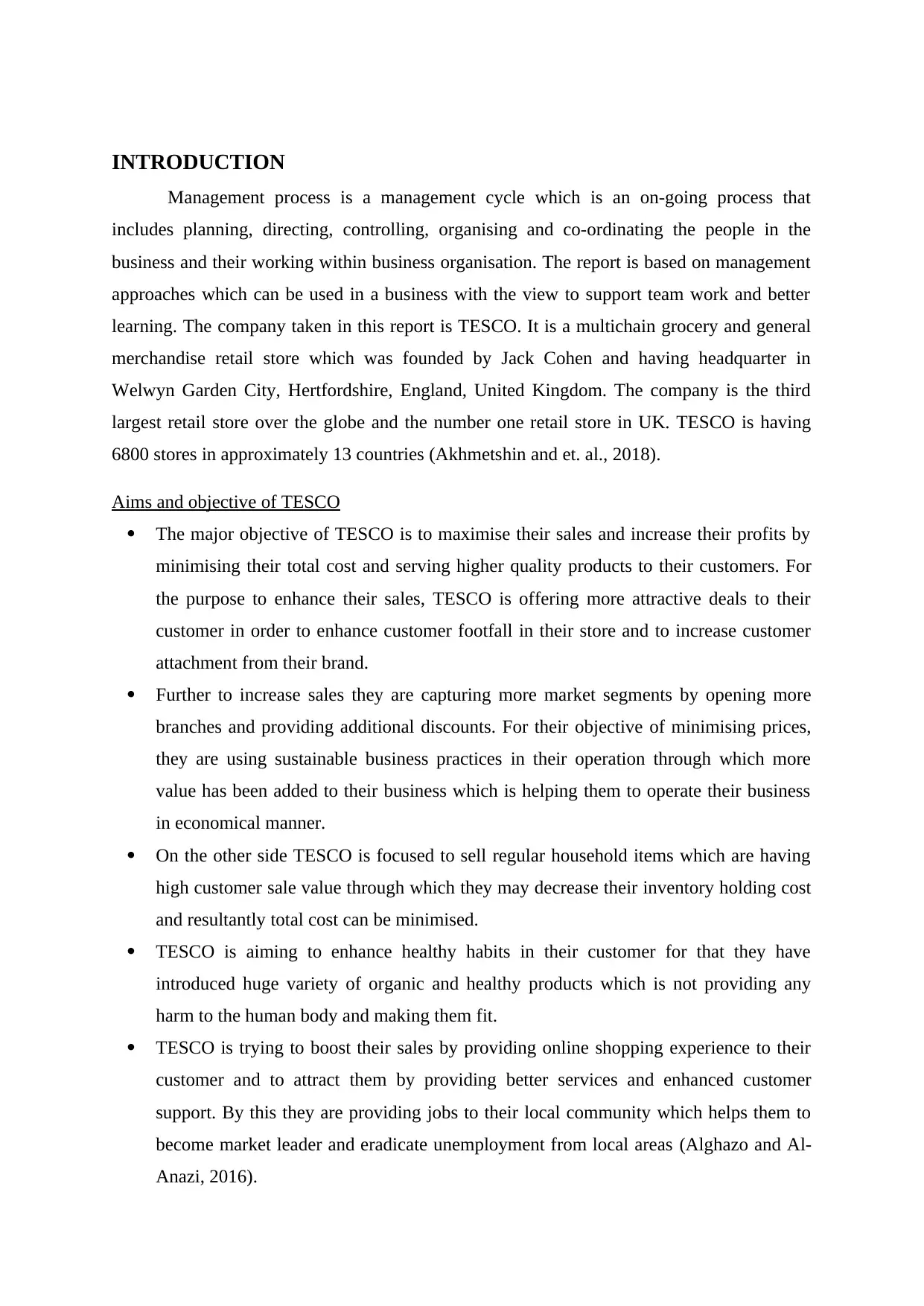
INTRODUCTION
Management process is a management cycle which is an on-going process that
includes planning, directing, controlling, organising and co-ordinating the people in the
business and their working within business organisation. The report is based on management
approaches which can be used in a business with the view to support team work and better
learning. The company taken in this report is TESCO. It is a multichain grocery and general
merchandise retail store which was founded by Jack Cohen and having headquarter in
Welwyn Garden City, Hertfordshire, England, United Kingdom. The company is the third
largest retail store over the globe and the number one retail store in UK. TESCO is having
6800 stores in approximately 13 countries (Akhmetshin and et. al., 2018).
Aims and objective of TESCO
The major objective of TESCO is to maximise their sales and increase their profits by
minimising their total cost and serving higher quality products to their customers. For
the purpose to enhance their sales, TESCO is offering more attractive deals to their
customer in order to enhance customer footfall in their store and to increase customer
attachment from their brand.
Further to increase sales they are capturing more market segments by opening more
branches and providing additional discounts. For their objective of minimising prices,
they are using sustainable business practices in their operation through which more
value has been added to their business which is helping them to operate their business
in economical manner.
On the other side TESCO is focused to sell regular household items which are having
high customer sale value through which they may decrease their inventory holding cost
and resultantly total cost can be minimised.
TESCO is aiming to enhance healthy habits in their customer for that they have
introduced huge variety of organic and healthy products which is not providing any
harm to the human body and making them fit.
TESCO is trying to boost their sales by providing online shopping experience to their
customer and to attract them by providing better services and enhanced customer
support. By this they are providing jobs to their local community which helps them to
become market leader and eradicate unemployment from local areas (Alghazo and Al-
Anazi, 2016).
Management process is a management cycle which is an on-going process that
includes planning, directing, controlling, organising and co-ordinating the people in the
business and their working within business organisation. The report is based on management
approaches which can be used in a business with the view to support team work and better
learning. The company taken in this report is TESCO. It is a multichain grocery and general
merchandise retail store which was founded by Jack Cohen and having headquarter in
Welwyn Garden City, Hertfordshire, England, United Kingdom. The company is the third
largest retail store over the globe and the number one retail store in UK. TESCO is having
6800 stores in approximately 13 countries (Akhmetshin and et. al., 2018).
Aims and objective of TESCO
The major objective of TESCO is to maximise their sales and increase their profits by
minimising their total cost and serving higher quality products to their customers. For
the purpose to enhance their sales, TESCO is offering more attractive deals to their
customer in order to enhance customer footfall in their store and to increase customer
attachment from their brand.
Further to increase sales they are capturing more market segments by opening more
branches and providing additional discounts. For their objective of minimising prices,
they are using sustainable business practices in their operation through which more
value has been added to their business which is helping them to operate their business
in economical manner.
On the other side TESCO is focused to sell regular household items which are having
high customer sale value through which they may decrease their inventory holding cost
and resultantly total cost can be minimised.
TESCO is aiming to enhance healthy habits in their customer for that they have
introduced huge variety of organic and healthy products which is not providing any
harm to the human body and making them fit.
TESCO is trying to boost their sales by providing online shopping experience to their
customer and to attract them by providing better services and enhanced customer
support. By this they are providing jobs to their local community which helps them to
become market leader and eradicate unemployment from local areas (Alghazo and Al-
Anazi, 2016).
⊘ This is a preview!⊘
Do you want full access?
Subscribe today to unlock all pages.

Trusted by 1+ million students worldwide
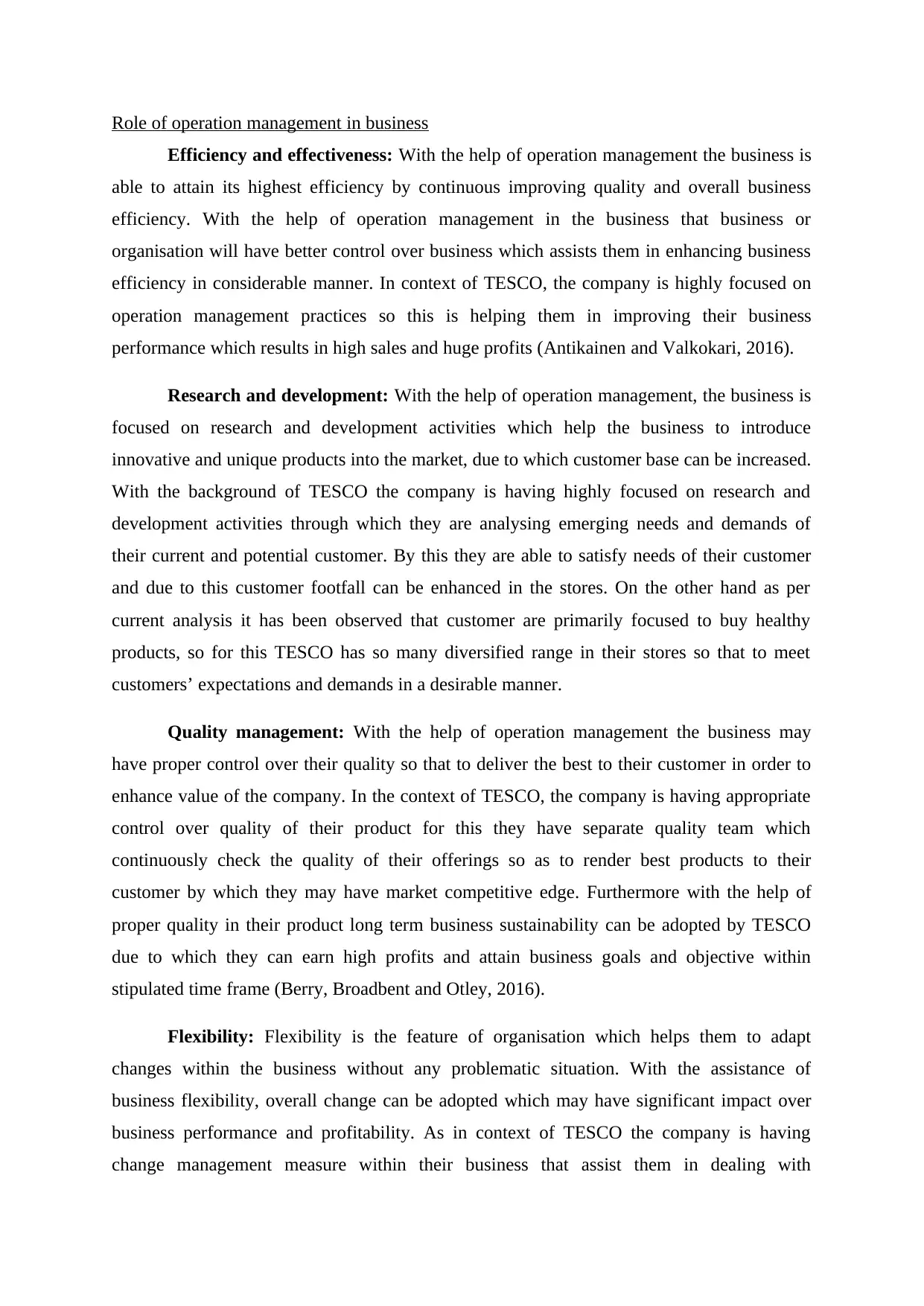
Role of operation management in business
Efficiency and effectiveness: With the help of operation management the business is
able to attain its highest efficiency by continuous improving quality and overall business
efficiency. With the help of operation management in the business that business or
organisation will have better control over business which assists them in enhancing business
efficiency in considerable manner. In context of TESCO, the company is highly focused on
operation management practices so this is helping them in improving their business
performance which results in high sales and huge profits (Antikainen and Valkokari, 2016).
Research and development: With the help of operation management, the business is
focused on research and development activities which help the business to introduce
innovative and unique products into the market, due to which customer base can be increased.
With the background of TESCO the company is having highly focused on research and
development activities through which they are analysing emerging needs and demands of
their current and potential customer. By this they are able to satisfy needs of their customer
and due to this customer footfall can be enhanced in the stores. On the other hand as per
current analysis it has been observed that customer are primarily focused to buy healthy
products, so for this TESCO has so many diversified range in their stores so that to meet
customers’ expectations and demands in a desirable manner.
Quality management: With the help of operation management the business may
have proper control over their quality so that to deliver the best to their customer in order to
enhance value of the company. In the context of TESCO, the company is having appropriate
control over quality of their product for this they have separate quality team which
continuously check the quality of their offerings so as to render best products to their
customer by which they may have market competitive edge. Furthermore with the help of
proper quality in their product long term business sustainability can be adopted by TESCO
due to which they can earn high profits and attain business goals and objective within
stipulated time frame (Berry, Broadbent and Otley, 2016).
Flexibility: Flexibility is the feature of organisation which helps them to adapt
changes within the business without any problematic situation. With the assistance of
business flexibility, overall change can be adopted which may have significant impact over
business performance and profitability. As in context of TESCO the company is having
change management measure within their business that assist them in dealing with
Efficiency and effectiveness: With the help of operation management the business is
able to attain its highest efficiency by continuous improving quality and overall business
efficiency. With the help of operation management in the business that business or
organisation will have better control over business which assists them in enhancing business
efficiency in considerable manner. In context of TESCO, the company is highly focused on
operation management practices so this is helping them in improving their business
performance which results in high sales and huge profits (Antikainen and Valkokari, 2016).
Research and development: With the help of operation management, the business is
focused on research and development activities which help the business to introduce
innovative and unique products into the market, due to which customer base can be increased.
With the background of TESCO the company is having highly focused on research and
development activities through which they are analysing emerging needs and demands of
their current and potential customer. By this they are able to satisfy needs of their customer
and due to this customer footfall can be enhanced in the stores. On the other hand as per
current analysis it has been observed that customer are primarily focused to buy healthy
products, so for this TESCO has so many diversified range in their stores so that to meet
customers’ expectations and demands in a desirable manner.
Quality management: With the help of operation management the business may
have proper control over their quality so that to deliver the best to their customer in order to
enhance value of the company. In the context of TESCO, the company is having appropriate
control over quality of their product for this they have separate quality team which
continuously check the quality of their offerings so as to render best products to their
customer by which they may have market competitive edge. Furthermore with the help of
proper quality in their product long term business sustainability can be adopted by TESCO
due to which they can earn high profits and attain business goals and objective within
stipulated time frame (Berry, Broadbent and Otley, 2016).
Flexibility: Flexibility is the feature of organisation which helps them to adapt
changes within the business without any problematic situation. With the assistance of
business flexibility, overall change can be adopted which may have significant impact over
business performance and profitability. As in context of TESCO the company is having
change management measure within their business that assist them in dealing with
Paraphrase This Document
Need a fresh take? Get an instant paraphrase of this document with our AI Paraphraser
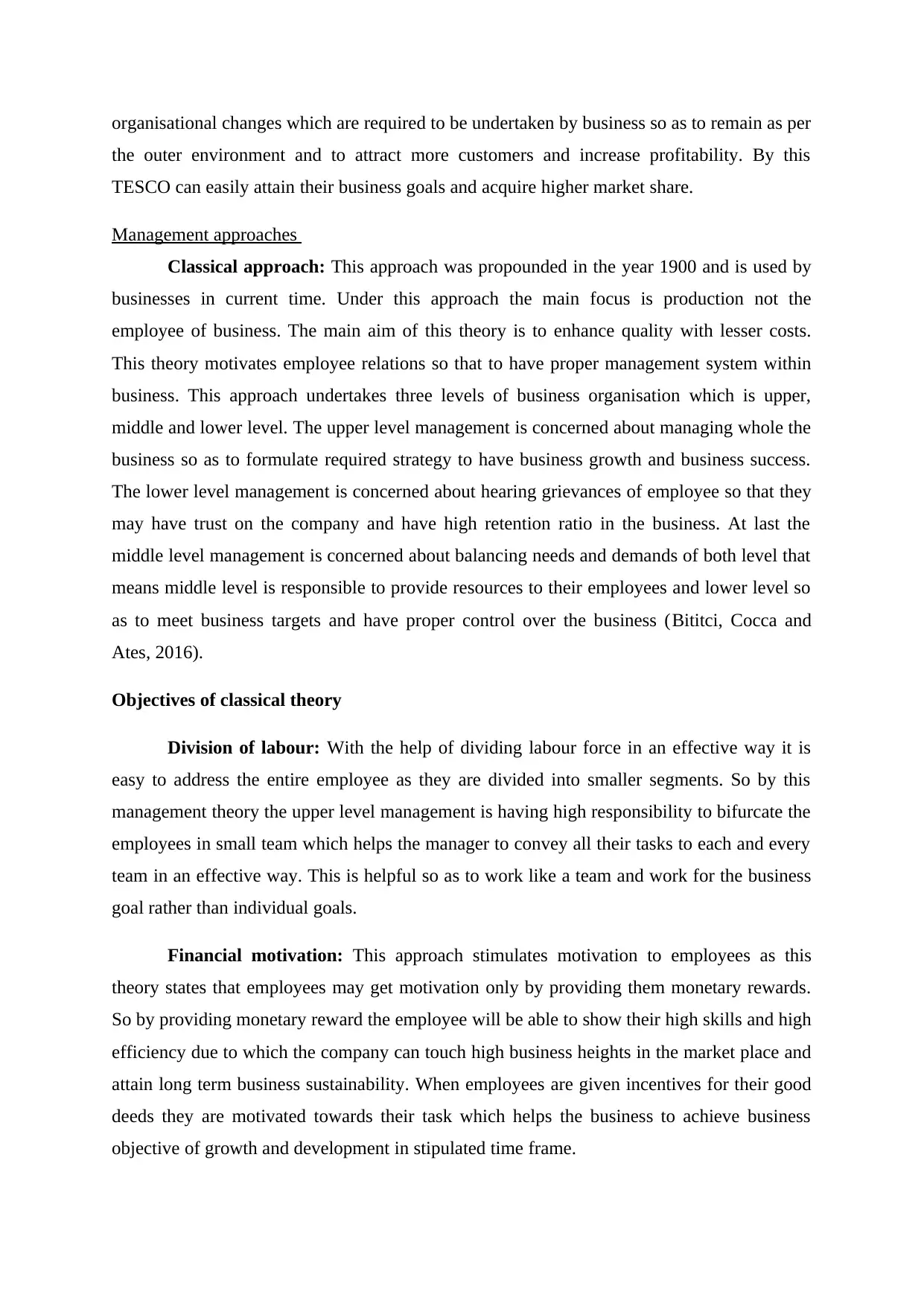
organisational changes which are required to be undertaken by business so as to remain as per
the outer environment and to attract more customers and increase profitability. By this
TESCO can easily attain their business goals and acquire higher market share.
Management approaches
Classical approach: This approach was propounded in the year 1900 and is used by
businesses in current time. Under this approach the main focus is production not the
employee of business. The main aim of this theory is to enhance quality with lesser costs.
This theory motivates employee relations so that to have proper management system within
business. This approach undertakes three levels of business organisation which is upper,
middle and lower level. The upper level management is concerned about managing whole the
business so as to formulate required strategy to have business growth and business success.
The lower level management is concerned about hearing grievances of employee so that they
may have trust on the company and have high retention ratio in the business. At last the
middle level management is concerned about balancing needs and demands of both level that
means middle level is responsible to provide resources to their employees and lower level so
as to meet business targets and have proper control over the business (Bititci, Cocca and
Ates, 2016).
Objectives of classical theory
Division of labour: With the help of dividing labour force in an effective way it is
easy to address the entire employee as they are divided into smaller segments. So by this
management theory the upper level management is having high responsibility to bifurcate the
employees in small team which helps the manager to convey all their tasks to each and every
team in an effective way. This is helpful so as to work like a team and work for the business
goal rather than individual goals.
Financial motivation: This approach stimulates motivation to employees as this
theory states that employees may get motivation only by providing them monetary rewards.
So by providing monetary reward the employee will be able to show their high skills and high
efficiency due to which the company can touch high business heights in the market place and
attain long term business sustainability. When employees are given incentives for their good
deeds they are motivated towards their task which helps the business to achieve business
objective of growth and development in stipulated time frame.
the outer environment and to attract more customers and increase profitability. By this
TESCO can easily attain their business goals and acquire higher market share.
Management approaches
Classical approach: This approach was propounded in the year 1900 and is used by
businesses in current time. Under this approach the main focus is production not the
employee of business. The main aim of this theory is to enhance quality with lesser costs.
This theory motivates employee relations so that to have proper management system within
business. This approach undertakes three levels of business organisation which is upper,
middle and lower level. The upper level management is concerned about managing whole the
business so as to formulate required strategy to have business growth and business success.
The lower level management is concerned about hearing grievances of employee so that they
may have trust on the company and have high retention ratio in the business. At last the
middle level management is concerned about balancing needs and demands of both level that
means middle level is responsible to provide resources to their employees and lower level so
as to meet business targets and have proper control over the business (Bititci, Cocca and
Ates, 2016).
Objectives of classical theory
Division of labour: With the help of dividing labour force in an effective way it is
easy to address the entire employee as they are divided into smaller segments. So by this
management theory the upper level management is having high responsibility to bifurcate the
employees in small team which helps the manager to convey all their tasks to each and every
team in an effective way. This is helpful so as to work like a team and work for the business
goal rather than individual goals.
Financial motivation: This approach stimulates motivation to employees as this
theory states that employees may get motivation only by providing them monetary rewards.
So by providing monetary reward the employee will be able to show their high skills and high
efficiency due to which the company can touch high business heights in the market place and
attain long term business sustainability. When employees are given incentives for their good
deeds they are motivated towards their task which helps the business to achieve business
objective of growth and development in stipulated time frame.
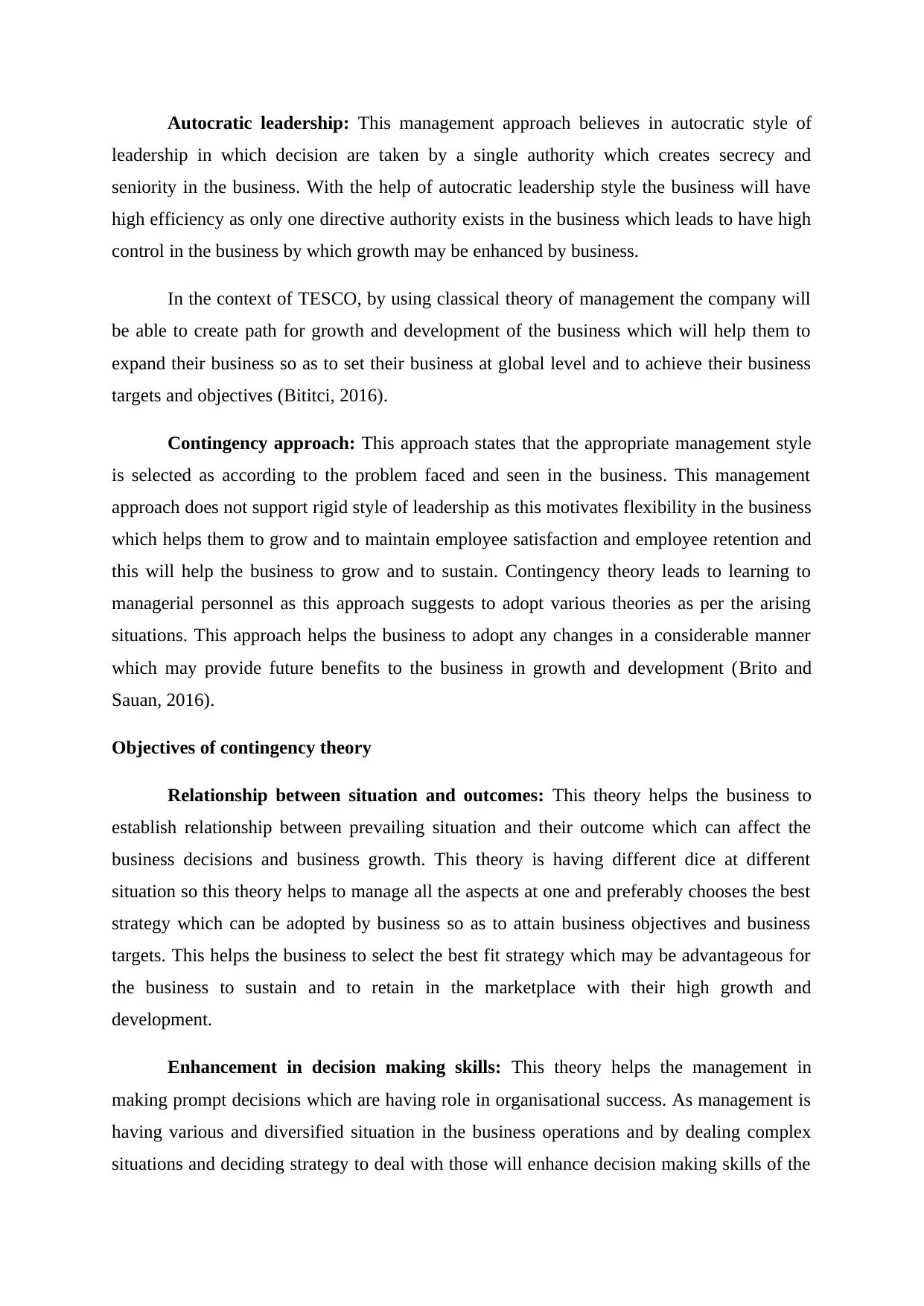
Autocratic leadership: This management approach believes in autocratic style of
leadership in which decision are taken by a single authority which creates secrecy and
seniority in the business. With the help of autocratic leadership style the business will have
high efficiency as only one directive authority exists in the business which leads to have high
control in the business by which growth may be enhanced by business.
In the context of TESCO, by using classical theory of management the company will
be able to create path for growth and development of the business which will help them to
expand their business so as to set their business at global level and to achieve their business
targets and objectives (Bititci, 2016).
Contingency approach: This approach states that the appropriate management style
is selected as according to the problem faced and seen in the business. This management
approach does not support rigid style of leadership as this motivates flexibility in the business
which helps them to grow and to maintain employee satisfaction and employee retention and
this will help the business to grow and to sustain. Contingency theory leads to learning to
managerial personnel as this approach suggests to adopt various theories as per the arising
situations. This approach helps the business to adopt any changes in a considerable manner
which may provide future benefits to the business in growth and development (Brito and
Sauan, 2016).
Objectives of contingency theory
Relationship between situation and outcomes: This theory helps the business to
establish relationship between prevailing situation and their outcome which can affect the
business decisions and business growth. This theory is having different dice at different
situation so this theory helps to manage all the aspects at one and preferably chooses the best
strategy which can be adopted by business so as to attain business objectives and business
targets. This helps the business to select the best fit strategy which may be advantageous for
the business to sustain and to retain in the marketplace with their high growth and
development.
Enhancement in decision making skills: This theory helps the management in
making prompt decisions which are having role in organisational success. As management is
having various and diversified situation in the business operations and by dealing complex
situations and deciding strategy to deal with those will enhance decision making skills of the
leadership in which decision are taken by a single authority which creates secrecy and
seniority in the business. With the help of autocratic leadership style the business will have
high efficiency as only one directive authority exists in the business which leads to have high
control in the business by which growth may be enhanced by business.
In the context of TESCO, by using classical theory of management the company will
be able to create path for growth and development of the business which will help them to
expand their business so as to set their business at global level and to achieve their business
targets and objectives (Bititci, 2016).
Contingency approach: This approach states that the appropriate management style
is selected as according to the problem faced and seen in the business. This management
approach does not support rigid style of leadership as this motivates flexibility in the business
which helps them to grow and to maintain employee satisfaction and employee retention and
this will help the business to grow and to sustain. Contingency theory leads to learning to
managerial personnel as this approach suggests to adopt various theories as per the arising
situations. This approach helps the business to adopt any changes in a considerable manner
which may provide future benefits to the business in growth and development (Brito and
Sauan, 2016).
Objectives of contingency theory
Relationship between situation and outcomes: This theory helps the business to
establish relationship between prevailing situation and their outcome which can affect the
business decisions and business growth. This theory is having different dice at different
situation so this theory helps to manage all the aspects at one and preferably chooses the best
strategy which can be adopted by business so as to attain business objectives and business
targets. This helps the business to select the best fit strategy which may be advantageous for
the business to sustain and to retain in the marketplace with their high growth and
development.
Enhancement in decision making skills: This theory helps the management in
making prompt decisions which are having role in organisational success. As management is
having various and diversified situation in the business operations and by dealing complex
situations and deciding strategy to deal with those will enhance decision making skills of the
⊘ This is a preview!⊘
Do you want full access?
Subscribe today to unlock all pages.

Trusted by 1+ million students worldwide
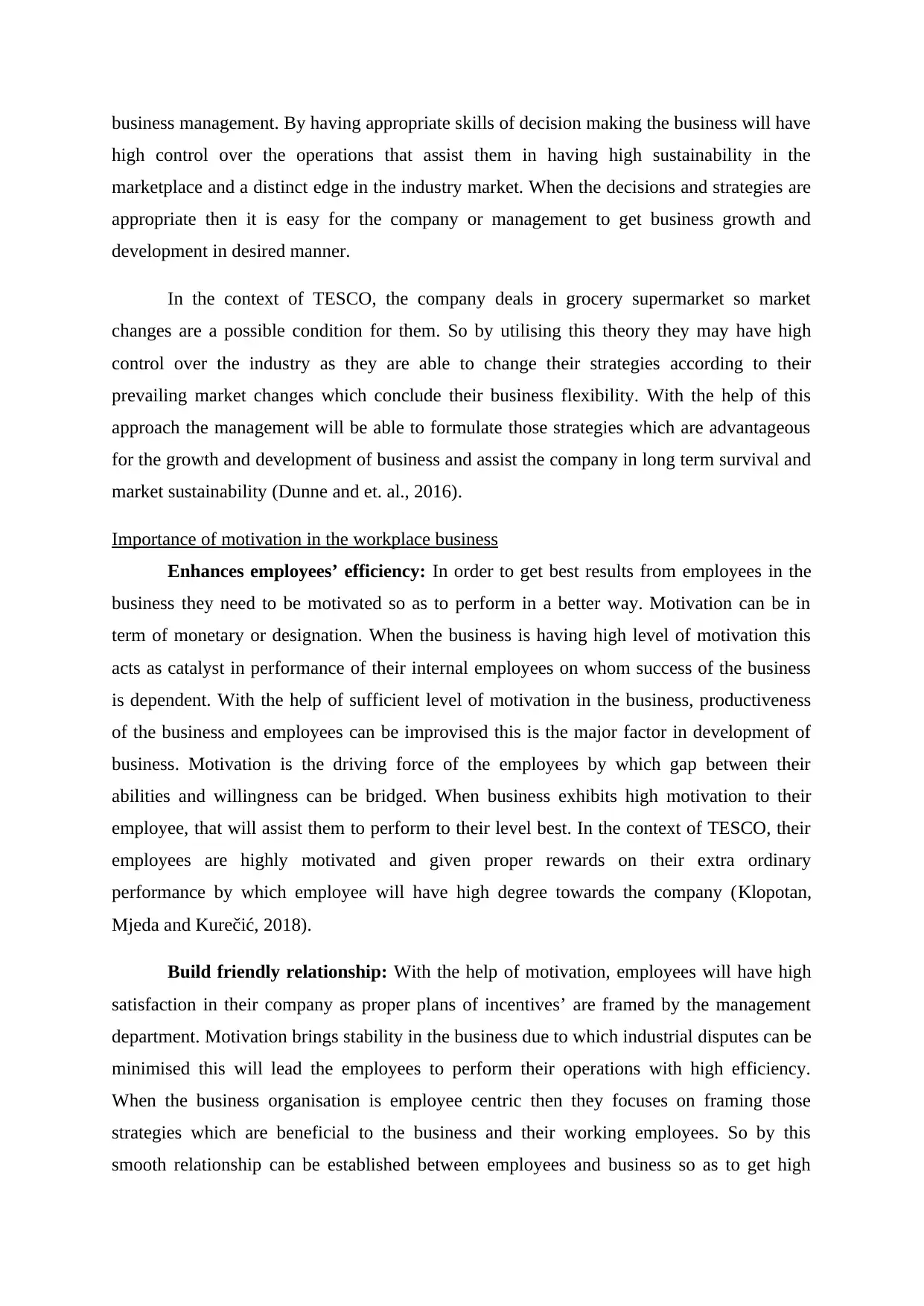
business management. By having appropriate skills of decision making the business will have
high control over the operations that assist them in having high sustainability in the
marketplace and a distinct edge in the industry market. When the decisions and strategies are
appropriate then it is easy for the company or management to get business growth and
development in desired manner.
In the context of TESCO, the company deals in grocery supermarket so market
changes are a possible condition for them. So by utilising this theory they may have high
control over the industry as they are able to change their strategies according to their
prevailing market changes which conclude their business flexibility. With the help of this
approach the management will be able to formulate those strategies which are advantageous
for the growth and development of business and assist the company in long term survival and
market sustainability (Dunne and et. al., 2016).
Importance of motivation in the workplace business
Enhances employees’ efficiency: In order to get best results from employees in the
business they need to be motivated so as to perform in a better way. Motivation can be in
term of monetary or designation. When the business is having high level of motivation this
acts as catalyst in performance of their internal employees on whom success of the business
is dependent. With the help of sufficient level of motivation in the business, productiveness
of the business and employees can be improvised this is the major factor in development of
business. Motivation is the driving force of the employees by which gap between their
abilities and willingness can be bridged. When business exhibits high motivation to their
employee, that will assist them to perform to their level best. In the context of TESCO, their
employees are highly motivated and given proper rewards on their extra ordinary
performance by which employee will have high degree towards the company (Klopotan,
Mjeda and Kurečić, 2018).
Build friendly relationship: With the help of motivation, employees will have high
satisfaction in their company as proper plans of incentives’ are framed by the management
department. Motivation brings stability in the business due to which industrial disputes can be
minimised this will lead the employees to perform their operations with high efficiency.
When the business organisation is employee centric then they focuses on framing those
strategies which are beneficial to the business and their working employees. So by this
smooth relationship can be established between employees and business so as to get high
high control over the operations that assist them in having high sustainability in the
marketplace and a distinct edge in the industry market. When the decisions and strategies are
appropriate then it is easy for the company or management to get business growth and
development in desired manner.
In the context of TESCO, the company deals in grocery supermarket so market
changes are a possible condition for them. So by utilising this theory they may have high
control over the industry as they are able to change their strategies according to their
prevailing market changes which conclude their business flexibility. With the help of this
approach the management will be able to formulate those strategies which are advantageous
for the growth and development of business and assist the company in long term survival and
market sustainability (Dunne and et. al., 2016).
Importance of motivation in the workplace business
Enhances employees’ efficiency: In order to get best results from employees in the
business they need to be motivated so as to perform in a better way. Motivation can be in
term of monetary or designation. When the business is having high level of motivation this
acts as catalyst in performance of their internal employees on whom success of the business
is dependent. With the help of sufficient level of motivation in the business, productiveness
of the business and employees can be improvised this is the major factor in development of
business. Motivation is the driving force of the employees by which gap between their
abilities and willingness can be bridged. When business exhibits high motivation to their
employee, that will assist them to perform to their level best. In the context of TESCO, their
employees are highly motivated and given proper rewards on their extra ordinary
performance by which employee will have high degree towards the company (Klopotan,
Mjeda and Kurečić, 2018).
Build friendly relationship: With the help of motivation, employees will have high
satisfaction in their company as proper plans of incentives’ are framed by the management
department. Motivation brings stability in the business due to which industrial disputes can be
minimised this will lead the employees to perform their operations with high efficiency.
When the business organisation is employee centric then they focuses on framing those
strategies which are beneficial to the business and their working employees. So by this
smooth relationship can be established between employees and business so as to get high
Paraphrase This Document
Need a fresh take? Get an instant paraphrase of this document with our AI Paraphraser
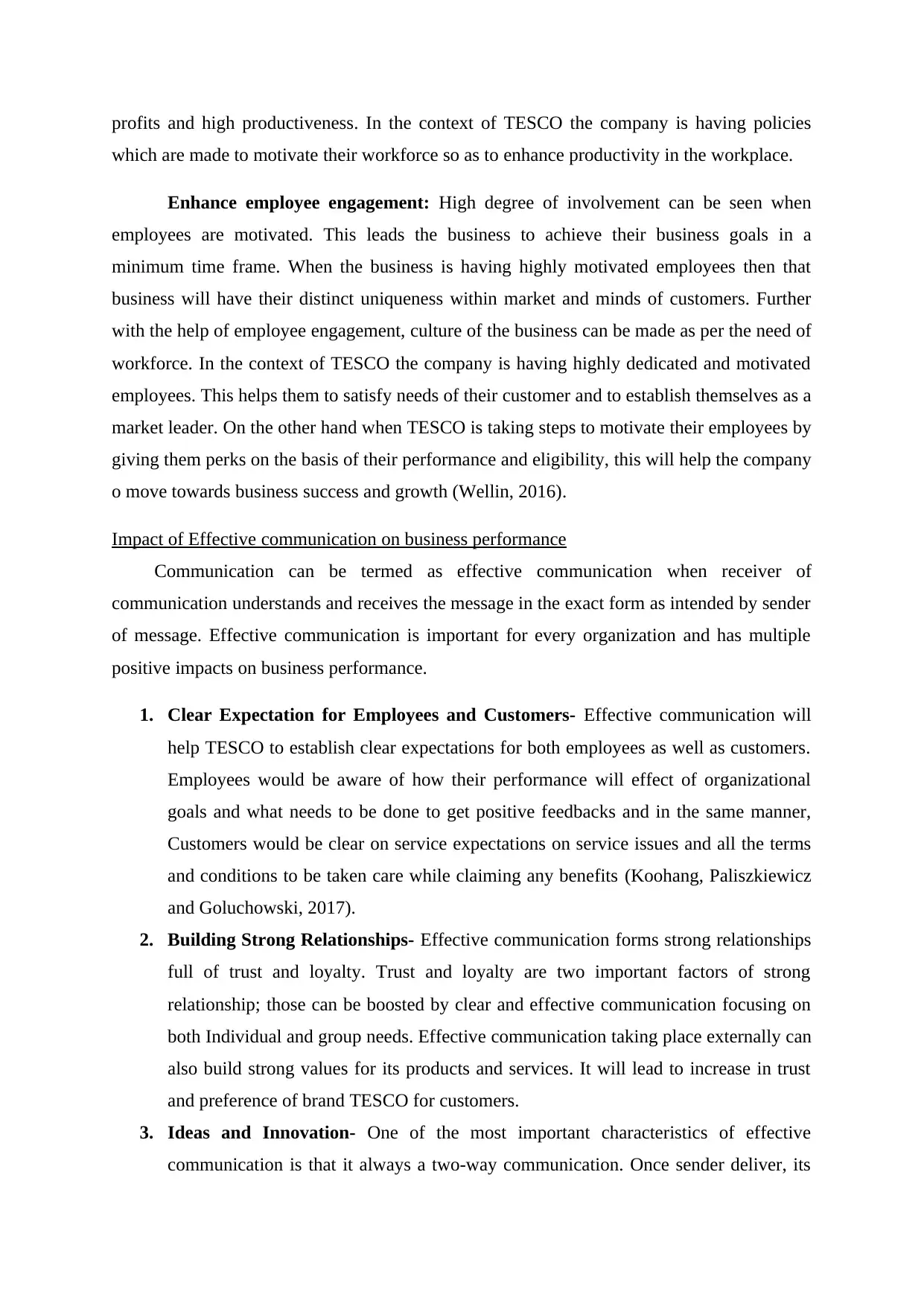
profits and high productiveness. In the context of TESCO the company is having policies
which are made to motivate their workforce so as to enhance productivity in the workplace.
Enhance employee engagement: High degree of involvement can be seen when
employees are motivated. This leads the business to achieve their business goals in a
minimum time frame. When the business is having highly motivated employees then that
business will have their distinct uniqueness within market and minds of customers. Further
with the help of employee engagement, culture of the business can be made as per the need of
workforce. In the context of TESCO the company is having highly dedicated and motivated
employees. This helps them to satisfy needs of their customer and to establish themselves as a
market leader. On the other hand when TESCO is taking steps to motivate their employees by
giving them perks on the basis of their performance and eligibility, this will help the company
o move towards business success and growth (Wellin, 2016).
Impact of Effective communication on business performance
Communication can be termed as effective communication when receiver of
communication understands and receives the message in the exact form as intended by sender
of message. Effective communication is important for every organization and has multiple
positive impacts on business performance.
1. Clear Expectation for Employees and Customers- Effective communication will
help TESCO to establish clear expectations for both employees as well as customers.
Employees would be aware of how their performance will effect of organizational
goals and what needs to be done to get positive feedbacks and in the same manner,
Customers would be clear on service expectations on service issues and all the terms
and conditions to be taken care while claiming any benefits (Koohang, Paliszkiewicz
and Goluchowski, 2017).
2. Building Strong Relationships- Effective communication forms strong relationships
full of trust and loyalty. Trust and loyalty are two important factors of strong
relationship; those can be boosted by clear and effective communication focusing on
both Individual and group needs. Effective communication taking place externally can
also build strong values for its products and services. It will lead to increase in trust
and preference of brand TESCO for customers.
3. Ideas and Innovation- One of the most important characteristics of effective
communication is that it always a two-way communication. Once sender deliver, its
which are made to motivate their workforce so as to enhance productivity in the workplace.
Enhance employee engagement: High degree of involvement can be seen when
employees are motivated. This leads the business to achieve their business goals in a
minimum time frame. When the business is having highly motivated employees then that
business will have their distinct uniqueness within market and minds of customers. Further
with the help of employee engagement, culture of the business can be made as per the need of
workforce. In the context of TESCO the company is having highly dedicated and motivated
employees. This helps them to satisfy needs of their customer and to establish themselves as a
market leader. On the other hand when TESCO is taking steps to motivate their employees by
giving them perks on the basis of their performance and eligibility, this will help the company
o move towards business success and growth (Wellin, 2016).
Impact of Effective communication on business performance
Communication can be termed as effective communication when receiver of
communication understands and receives the message in the exact form as intended by sender
of message. Effective communication is important for every organization and has multiple
positive impacts on business performance.
1. Clear Expectation for Employees and Customers- Effective communication will
help TESCO to establish clear expectations for both employees as well as customers.
Employees would be aware of how their performance will effect of organizational
goals and what needs to be done to get positive feedbacks and in the same manner,
Customers would be clear on service expectations on service issues and all the terms
and conditions to be taken care while claiming any benefits (Koohang, Paliszkiewicz
and Goluchowski, 2017).
2. Building Strong Relationships- Effective communication forms strong relationships
full of trust and loyalty. Trust and loyalty are two important factors of strong
relationship; those can be boosted by clear and effective communication focusing on
both Individual and group needs. Effective communication taking place externally can
also build strong values for its products and services. It will lead to increase in trust
and preference of brand TESCO for customers.
3. Ideas and Innovation- One of the most important characteristics of effective
communication is that it always a two-way communication. Once sender deliver, its
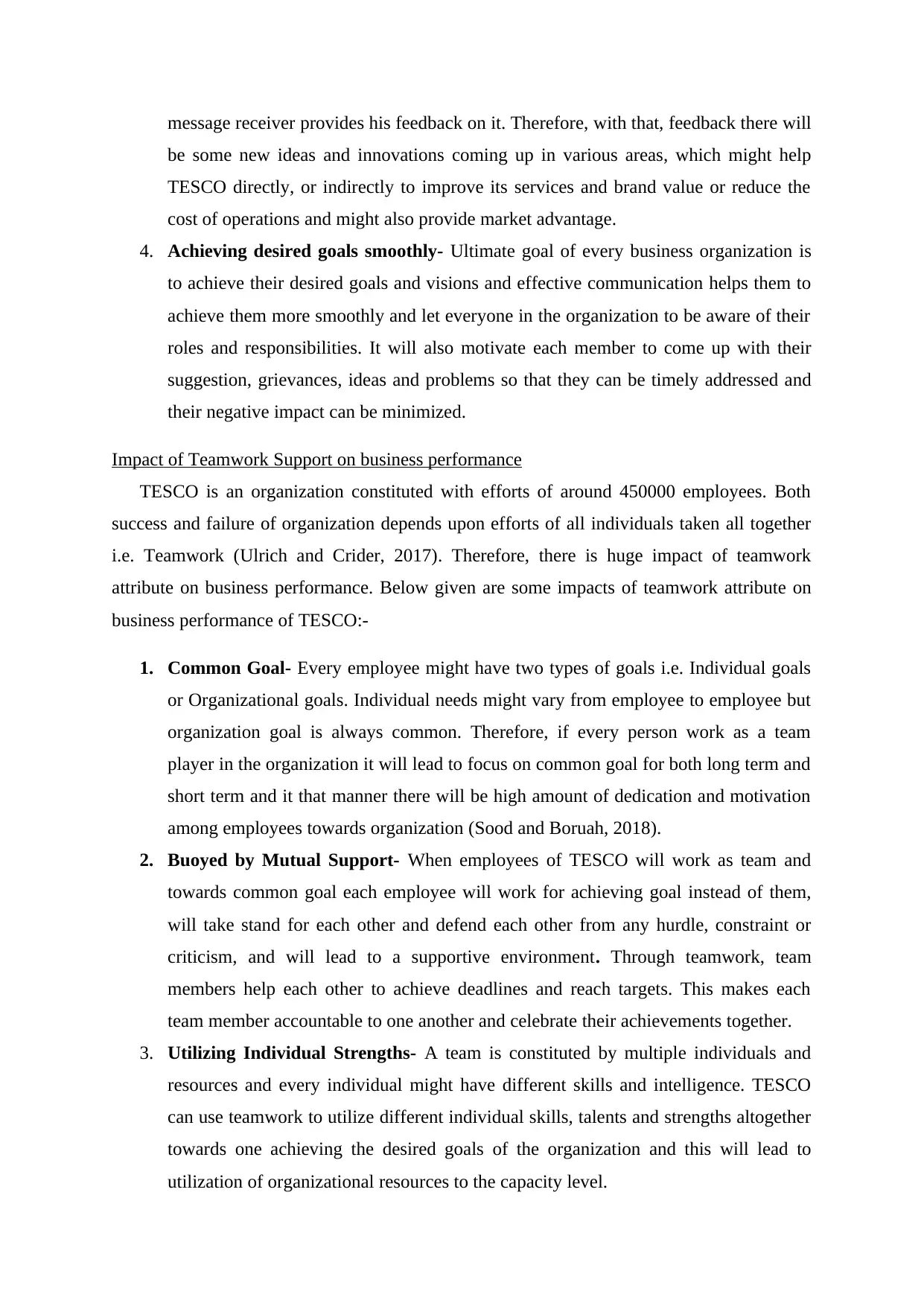
message receiver provides his feedback on it. Therefore, with that, feedback there will
be some new ideas and innovations coming up in various areas, which might help
TESCO directly, or indirectly to improve its services and brand value or reduce the
cost of operations and might also provide market advantage.
4. Achieving desired goals smoothly- Ultimate goal of every business organization is
to achieve their desired goals and visions and effective communication helps them to
achieve them more smoothly and let everyone in the organization to be aware of their
roles and responsibilities. It will also motivate each member to come up with their
suggestion, grievances, ideas and problems so that they can be timely addressed and
their negative impact can be minimized.
Impact of Teamwork Support on business performance
TESCO is an organization constituted with efforts of around 450000 employees. Both
success and failure of organization depends upon efforts of all individuals taken all together
i.e. Teamwork (Ulrich and Crider, 2017). Therefore, there is huge impact of teamwork
attribute on business performance. Below given are some impacts of teamwork attribute on
business performance of TESCO:-
1. Common Goal- Every employee might have two types of goals i.e. Individual goals
or Organizational goals. Individual needs might vary from employee to employee but
organization goal is always common. Therefore, if every person work as a team
player in the organization it will lead to focus on common goal for both long term and
short term and it that manner there will be high amount of dedication and motivation
among employees towards organization (Sood and Boruah, 2018).
2. Buoyed by Mutual Support- When employees of TESCO will work as team and
towards common goal each employee will work for achieving goal instead of them,
will take stand for each other and defend each other from any hurdle, constraint or
criticism, and will lead to a supportive environment. Through teamwork, team
members help each other to achieve deadlines and reach targets. This makes each
team member accountable to one another and celebrate their achievements together.
3. Utilizing Individual Strengths- A team is constituted by multiple individuals and
resources and every individual might have different skills and intelligence. TESCO
can use teamwork to utilize different individual skills, talents and strengths altogether
towards one achieving the desired goals of the organization and this will lead to
utilization of organizational resources to the capacity level.
be some new ideas and innovations coming up in various areas, which might help
TESCO directly, or indirectly to improve its services and brand value or reduce the
cost of operations and might also provide market advantage.
4. Achieving desired goals smoothly- Ultimate goal of every business organization is
to achieve their desired goals and visions and effective communication helps them to
achieve them more smoothly and let everyone in the organization to be aware of their
roles and responsibilities. It will also motivate each member to come up with their
suggestion, grievances, ideas and problems so that they can be timely addressed and
their negative impact can be minimized.
Impact of Teamwork Support on business performance
TESCO is an organization constituted with efforts of around 450000 employees. Both
success and failure of organization depends upon efforts of all individuals taken all together
i.e. Teamwork (Ulrich and Crider, 2017). Therefore, there is huge impact of teamwork
attribute on business performance. Below given are some impacts of teamwork attribute on
business performance of TESCO:-
1. Common Goal- Every employee might have two types of goals i.e. Individual goals
or Organizational goals. Individual needs might vary from employee to employee but
organization goal is always common. Therefore, if every person work as a team
player in the organization it will lead to focus on common goal for both long term and
short term and it that manner there will be high amount of dedication and motivation
among employees towards organization (Sood and Boruah, 2018).
2. Buoyed by Mutual Support- When employees of TESCO will work as team and
towards common goal each employee will work for achieving goal instead of them,
will take stand for each other and defend each other from any hurdle, constraint or
criticism, and will lead to a supportive environment. Through teamwork, team
members help each other to achieve deadlines and reach targets. This makes each
team member accountable to one another and celebrate their achievements together.
3. Utilizing Individual Strengths- A team is constituted by multiple individuals and
resources and every individual might have different skills and intelligence. TESCO
can use teamwork to utilize different individual skills, talents and strengths altogether
towards one achieving the desired goals of the organization and this will lead to
utilization of organizational resources to the capacity level.
⊘ This is a preview!⊘
Do you want full access?
Subscribe today to unlock all pages.

Trusted by 1+ million students worldwide
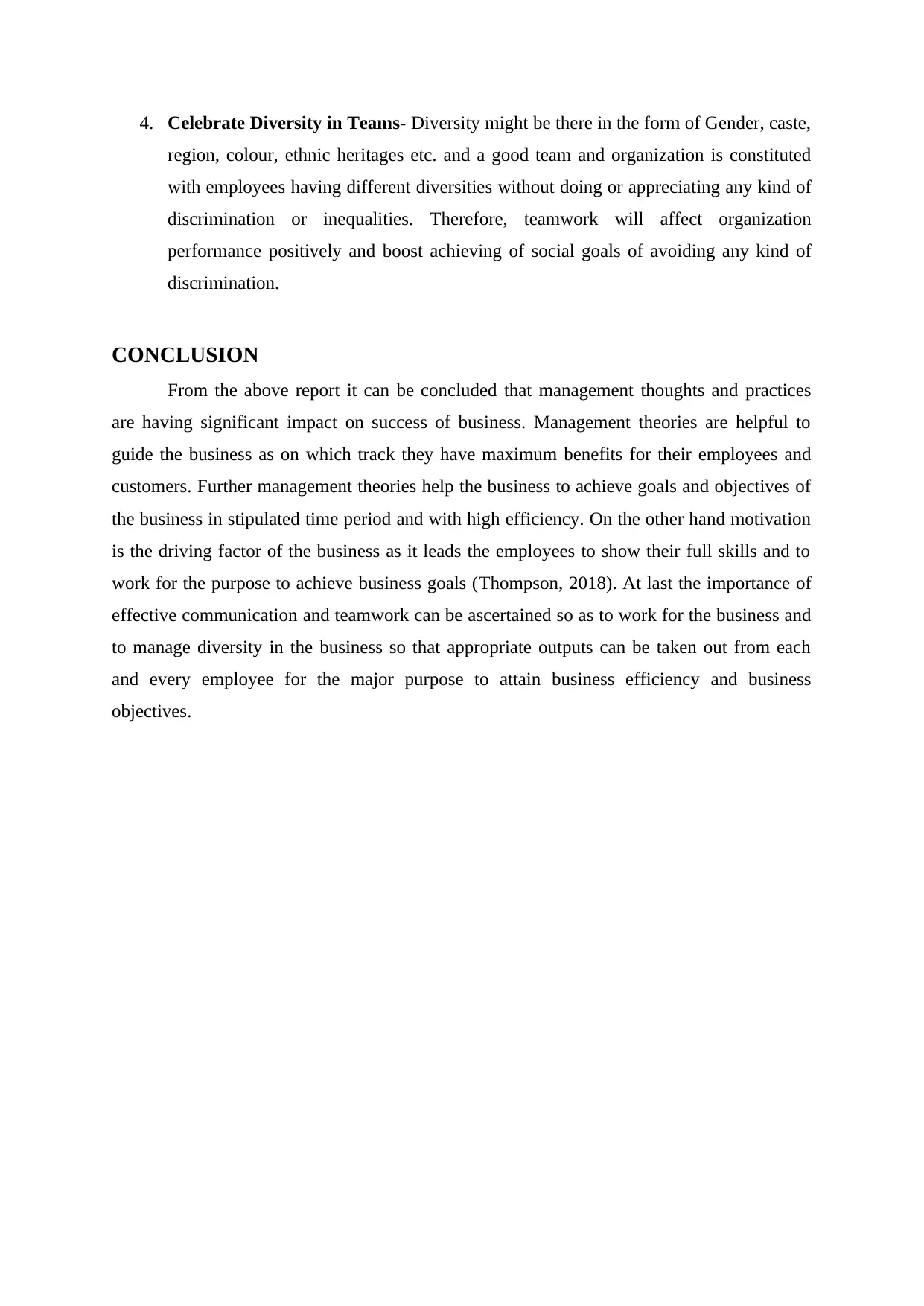
4. Celebrate Diversity in Teams- Diversity might be there in the form of Gender, caste,
region, colour, ethnic heritages etc. and a good team and organization is constituted
with employees having different diversities without doing or appreciating any kind of
discrimination or inequalities. Therefore, teamwork will affect organization
performance positively and boost achieving of social goals of avoiding any kind of
discrimination.
CONCLUSION
From the above report it can be concluded that management thoughts and practices
are having significant impact on success of business. Management theories are helpful to
guide the business as on which track they have maximum benefits for their employees and
customers. Further management theories help the business to achieve goals and objectives of
the business in stipulated time period and with high efficiency. On the other hand motivation
is the driving factor of the business as it leads the employees to show their full skills and to
work for the purpose to achieve business goals (Thompson, 2018). At last the importance of
effective communication and teamwork can be ascertained so as to work for the business and
to manage diversity in the business so that appropriate outputs can be taken out from each
and every employee for the major purpose to attain business efficiency and business
objectives.
region, colour, ethnic heritages etc. and a good team and organization is constituted
with employees having different diversities without doing or appreciating any kind of
discrimination or inequalities. Therefore, teamwork will affect organization
performance positively and boost achieving of social goals of avoiding any kind of
discrimination.
CONCLUSION
From the above report it can be concluded that management thoughts and practices
are having significant impact on success of business. Management theories are helpful to
guide the business as on which track they have maximum benefits for their employees and
customers. Further management theories help the business to achieve goals and objectives of
the business in stipulated time period and with high efficiency. On the other hand motivation
is the driving factor of the business as it leads the employees to show their full skills and to
work for the purpose to achieve business goals (Thompson, 2018). At last the importance of
effective communication and teamwork can be ascertained so as to work for the business and
to manage diversity in the business so that appropriate outputs can be taken out from each
and every employee for the major purpose to attain business efficiency and business
objectives.
Paraphrase This Document
Need a fresh take? Get an instant paraphrase of this document with our AI Paraphraser
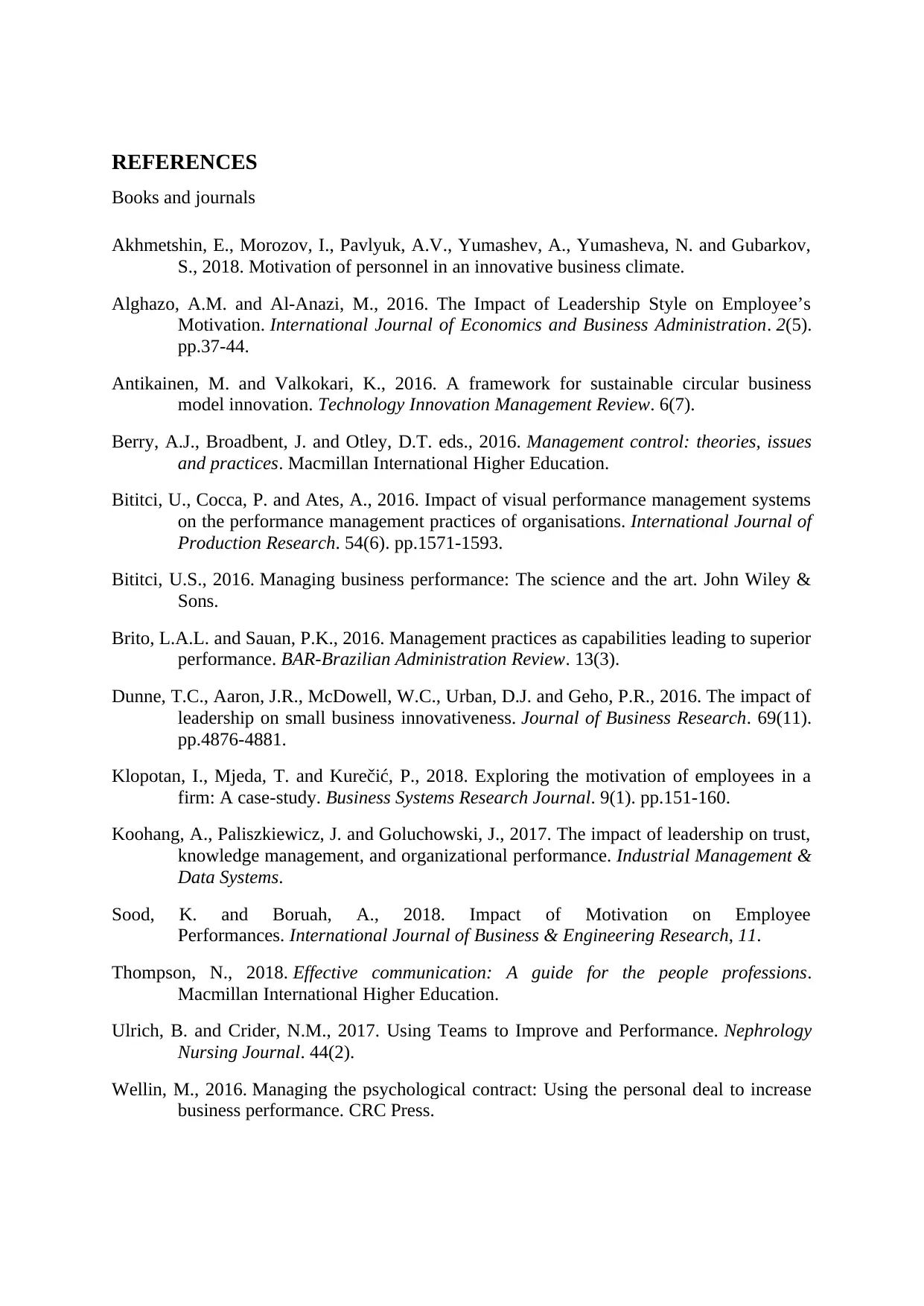
REFERENCES
Books and journals
Akhmetshin, E., Morozov, I., Pavlyuk, A.V., Yumashev, A., Yumasheva, N. and Gubarkov,
S., 2018. Motivation of personnel in an innovative business climate.
Alghazo, A.M. and Al-Anazi, M., 2016. The Impact of Leadership Style on Employee’s
Motivation. International Journal of Economics and Business Administration. 2(5).
pp.37-44.
Antikainen, M. and Valkokari, K., 2016. A framework for sustainable circular business
model innovation. Technology Innovation Management Review. 6(7).
Berry, A.J., Broadbent, J. and Otley, D.T. eds., 2016. Management control: theories, issues
and practices. Macmillan International Higher Education.
Bititci, U., Cocca, P. and Ates, A., 2016. Impact of visual performance management systems
on the performance management practices of organisations. International Journal of
Production Research. 54(6). pp.1571-1593.
Bititci, U.S., 2016. Managing business performance: The science and the art. John Wiley &
Sons.
Brito, L.A.L. and Sauan, P.K., 2016. Management practices as capabilities leading to superior
performance. BAR-Brazilian Administration Review. 13(3).
Dunne, T.C., Aaron, J.R., McDowell, W.C., Urban, D.J. and Geho, P.R., 2016. The impact of
leadership on small business innovativeness. Journal of Business Research. 69(11).
pp.4876-4881.
Klopotan, I., Mjeda, T. and Kurečić, P., 2018. Exploring the motivation of employees in a
firm: A case-study. Business Systems Research Journal. 9(1). pp.151-160.
Koohang, A., Paliszkiewicz, J. and Goluchowski, J., 2017. The impact of leadership on trust,
knowledge management, and organizational performance. Industrial Management &
Data Systems.
Sood, K. and Boruah, A., 2018. Impact of Motivation on Employee
Performances. International Journal of Business & Engineering Research, 11.
Thompson, N., 2018. Effective communication: A guide for the people professions.
Macmillan International Higher Education.
Ulrich, B. and Crider, N.M., 2017. Using Teams to Improve and Performance. Nephrology
Nursing Journal. 44(2).
Wellin, M., 2016. Managing the psychological contract: Using the personal deal to increase
business performance. CRC Press.
Books and journals
Akhmetshin, E., Morozov, I., Pavlyuk, A.V., Yumashev, A., Yumasheva, N. and Gubarkov,
S., 2018. Motivation of personnel in an innovative business climate.
Alghazo, A.M. and Al-Anazi, M., 2016. The Impact of Leadership Style on Employee’s
Motivation. International Journal of Economics and Business Administration. 2(5).
pp.37-44.
Antikainen, M. and Valkokari, K., 2016. A framework for sustainable circular business
model innovation. Technology Innovation Management Review. 6(7).
Berry, A.J., Broadbent, J. and Otley, D.T. eds., 2016. Management control: theories, issues
and practices. Macmillan International Higher Education.
Bititci, U., Cocca, P. and Ates, A., 2016. Impact of visual performance management systems
on the performance management practices of organisations. International Journal of
Production Research. 54(6). pp.1571-1593.
Bititci, U.S., 2016. Managing business performance: The science and the art. John Wiley &
Sons.
Brito, L.A.L. and Sauan, P.K., 2016. Management practices as capabilities leading to superior
performance. BAR-Brazilian Administration Review. 13(3).
Dunne, T.C., Aaron, J.R., McDowell, W.C., Urban, D.J. and Geho, P.R., 2016. The impact of
leadership on small business innovativeness. Journal of Business Research. 69(11).
pp.4876-4881.
Klopotan, I., Mjeda, T. and Kurečić, P., 2018. Exploring the motivation of employees in a
firm: A case-study. Business Systems Research Journal. 9(1). pp.151-160.
Koohang, A., Paliszkiewicz, J. and Goluchowski, J., 2017. The impact of leadership on trust,
knowledge management, and organizational performance. Industrial Management &
Data Systems.
Sood, K. and Boruah, A., 2018. Impact of Motivation on Employee
Performances. International Journal of Business & Engineering Research, 11.
Thompson, N., 2018. Effective communication: A guide for the people professions.
Macmillan International Higher Education.
Ulrich, B. and Crider, N.M., 2017. Using Teams to Improve and Performance. Nephrology
Nursing Journal. 44(2).
Wellin, M., 2016. Managing the psychological contract: Using the personal deal to increase
business performance. CRC Press.

⊘ This is a preview!⊘
Do you want full access?
Subscribe today to unlock all pages.

Trusted by 1+ million students worldwide
1 out of 12
Related Documents
Your All-in-One AI-Powered Toolkit for Academic Success.
+13062052269
info@desklib.com
Available 24*7 on WhatsApp / Email
![[object Object]](/_next/static/media/star-bottom.7253800d.svg)
Unlock your academic potential
Copyright © 2020–2026 A2Z Services. All Rights Reserved. Developed and managed by ZUCOL.





